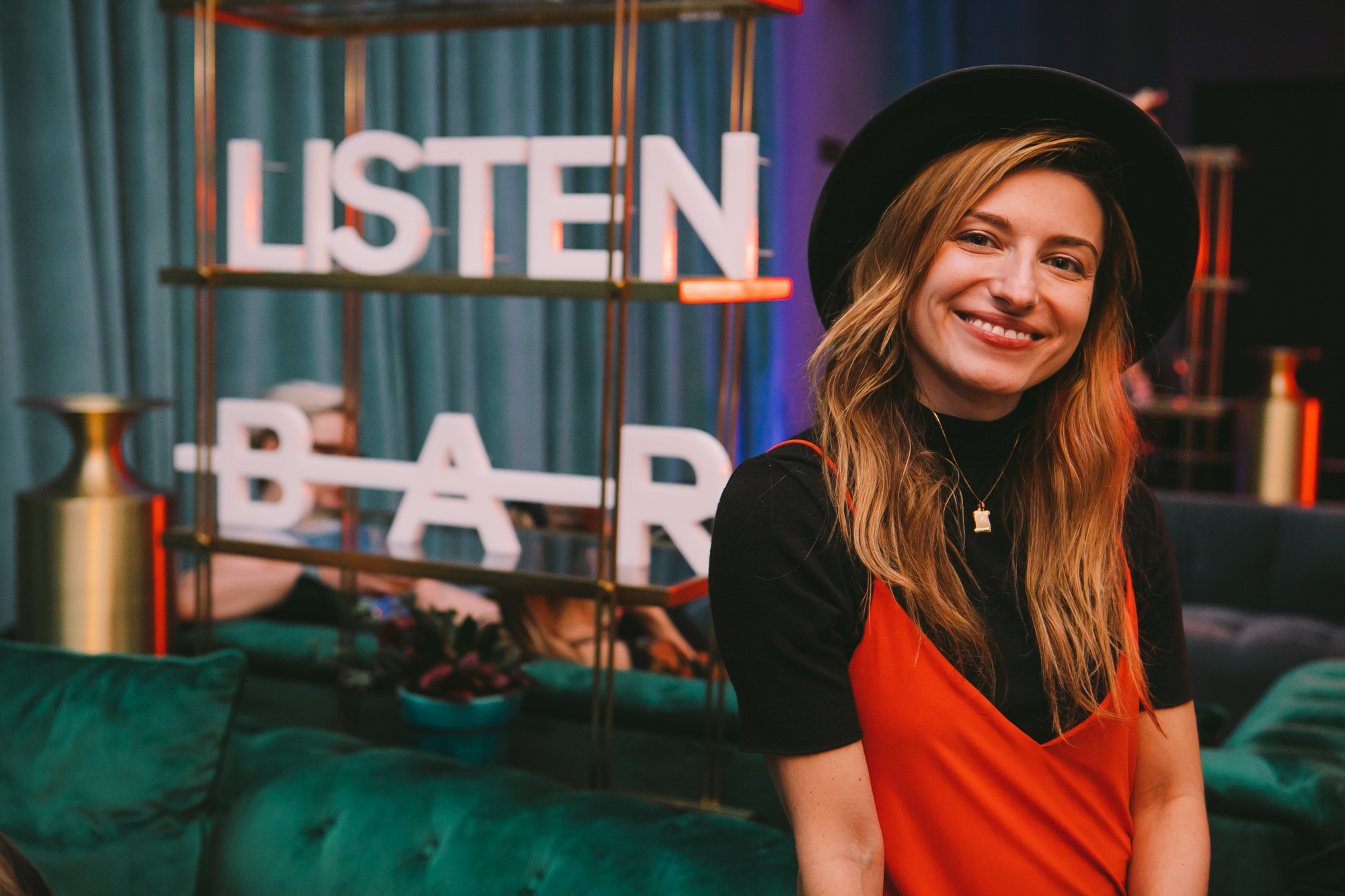In October of 2018 Listen Bar, New York’s first alcohol-free bar, opened its doors.
People gathered to enjoy delicious alcohol-free cocktails and the lively atmosphere uplifted by music and good conversation. It was the start of a new scene in New York.
Hosted as a pop-up, Listen Bar’s opening day was met with a long waiting list and a jam-packed venue where people were standing shoulder to shoulder.
The event was covered by major media outlets such as The New York Times and Forbes, as well as popular morning TV shows such as TODAY and Good Morning America.
Ever since Listen Bar has held pop-up events in and outside New York and has become known and loved for their alcohol-free parties.
The founder of Listen Bar is Lorelei Bandrovschi from Romania.
Lorelei says she used to drink alcohol regularly, so how is it that she became the pioneer of the alcohol-free industry she is today?
And why is it that this new concept of an alcohol-free bar has become so popular and well-received by so many people? What kind of excitement and frenzy do people get out of going to non-alcoholic bars?
What is it that attracts waves of people, whether they drink alcohol or not, to the Listen Bar?
We interviewed Lorelei as the first Japanese media to pick up on this story.
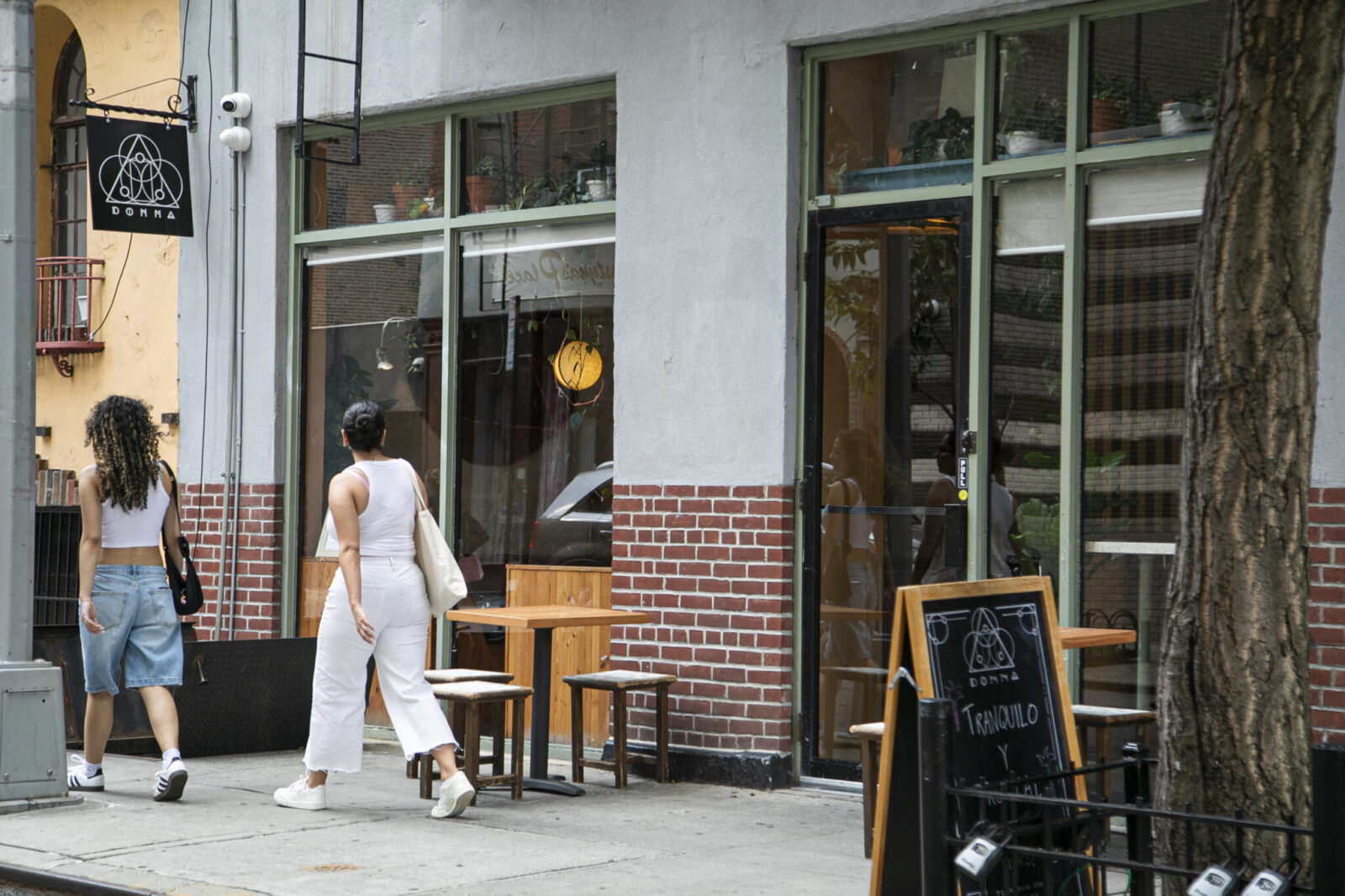
“People won’t come if the alcohol-free drinks are not delicious”
Greenwich Village is said to be the birthplace of the counterculture movement in NYC and is lined with popular cafes and bars. On a rainy evening, we met up with Lorelei in a bar called Donna that was already beginning to bustle with customers.
From the simple first exchange of saying “Hi!” and her friendly smile, we could tell she had a special energy about her.
The English word “sober” is not only defined as “not drunk” but can also mean “being reserved and serious”, but her energy seems to be the opposite.
As soon as she sits down at the bar counter she notices a bottle of Ritual Zero Proof, a non-alcoholic spirit.
After taking a sip of the drink she ordered, she smiles broadly as she says, “It’s really delicious!”
“Alcohol-free drinks need to be delicious. If it doesn’t taste good, people won’t come. They do a really good job here.” Although it is her first time at this bar, she seems to have taken a liking to it.
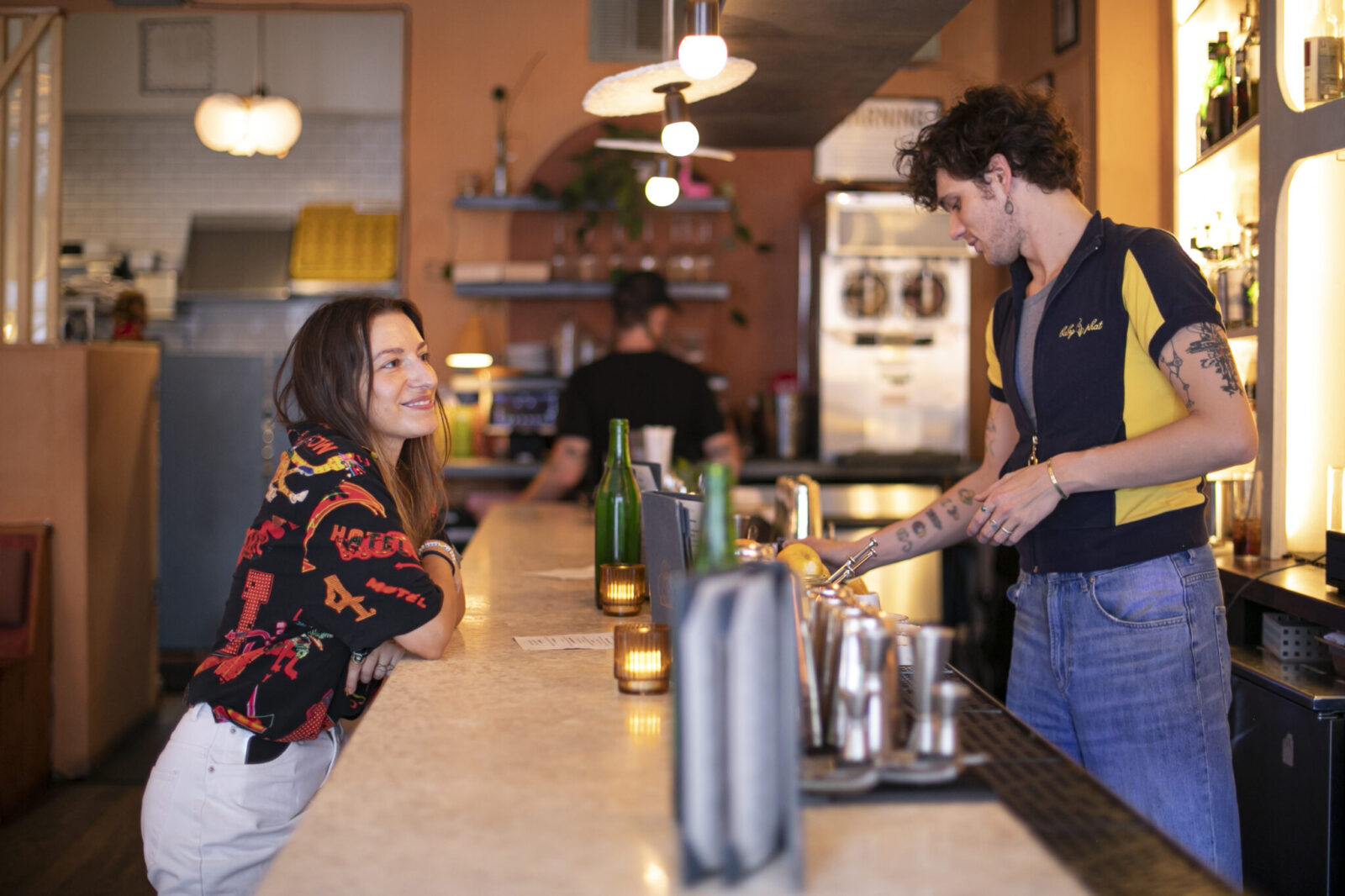
An alcohol-free bar where people who are not in the mood for alcohol can gather
Rather than serving simple sweet non-alcoholic drinks, there is a growing number of bars in New York that are serving alcohol-free drinks with complex flavors that suit the adult palate. In recent years, more bars have introduced Mixology(*) which pays particular attention to special ingredients and recipes.
(*Mixology is a method of making cocktails and drinks by combining different ingredients such as fresh fruits, herbs, and spices. The term combines the words “mix” and “ology”)
Listen Bar is a pioneer in this trend and they have collaborated with various venues, including renowned hotels, clubs, and fashion shows, to host more than fifty pop-up events to date.
When Listen Bar first opened in 2018, there was a misconception that alcohol-free bars were a place only for sober people. However, Listen Bar is designed as a welcoming space for a variety of peopleーnot just those who never drink, but also those who decide not to drink on a particular day or simply aren’t in the mood for alcohol.
In the context of New York’s nightlife, what would a space that offers a fantastic experience without alcohol even look like?
It was this curiosity — the desire to see with her own eyes what such a completely new kind of space could be — that became her driving force in starting her own venture.
“Culturally and socially, the term “sober” has been seen as something only for people who want to quit drinking. But a lot of people don’t feel the need to give up alcohol entirely, or they find sobriety intimidating.”
“Then, the ‘sober-curious’ movement emerged. It spread the idea that you don’t have to label yourself as a drinker or non-drinker or decide on a certain lifestyle. Even if you drink alcohol regularly, choosing not to drink occasionally has its value — and that’s what I believe in.”
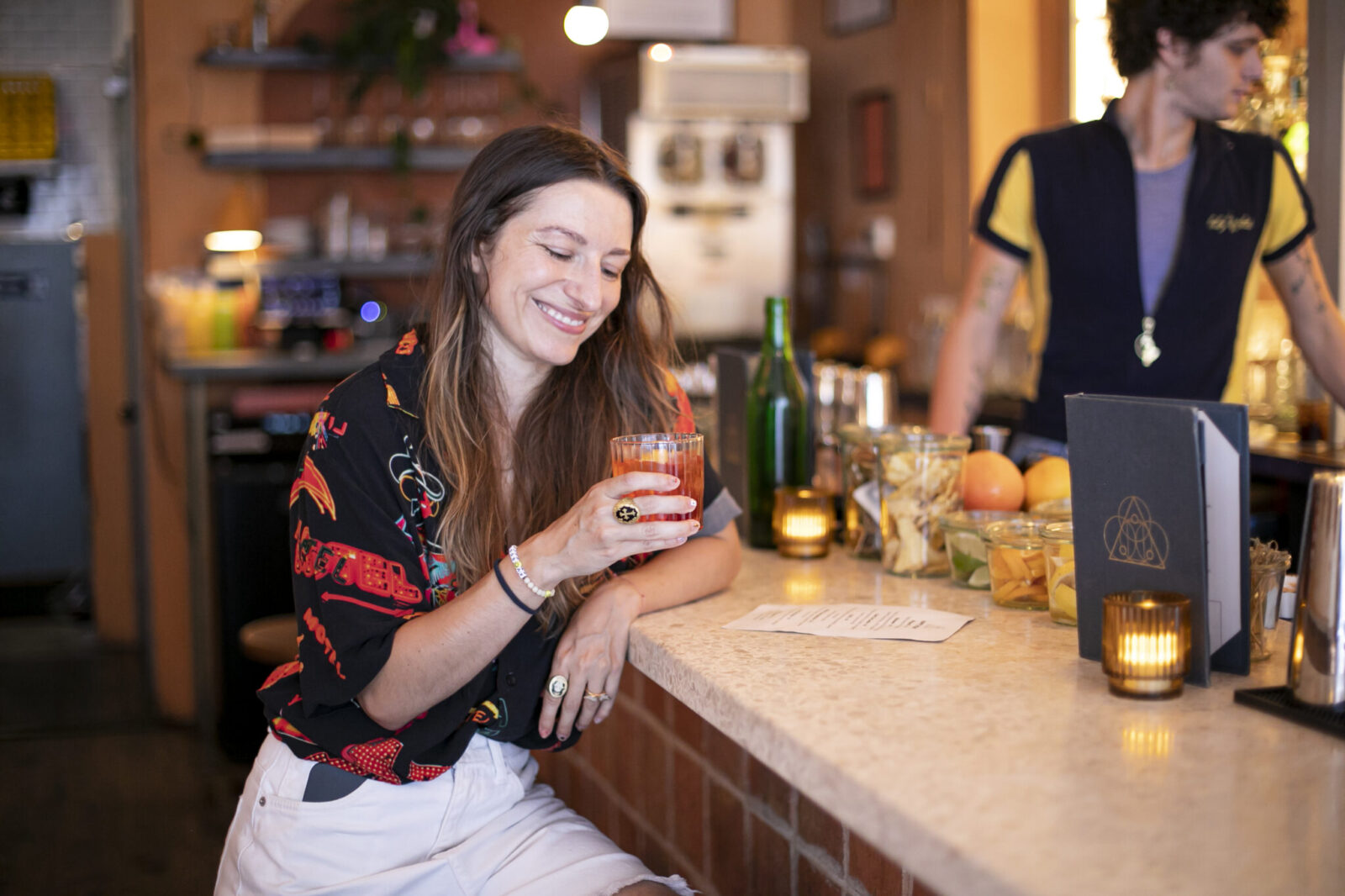
Realizations from the “Sober Curious” Experiment
For her, who came from the advertising industry, drinking alcohol was a daily habit. She would order a drink with meals, then head to another spot for drinks afterward. Whether at the movies or music events, alcohol was naturally a part of the experience and she drank it without a second thought.
One day, her friend dared her, “Let’s try a month without drinking.”
She is not one to diet or restrict herself so she was reluctant at first, but once she gave it a try, she was surprised to find that she was really into it.
“After taking a month off from drinking, I realized for the first time that drinking is optional. And I found that I liked myself more when I wasn’t drinking than when I was.”
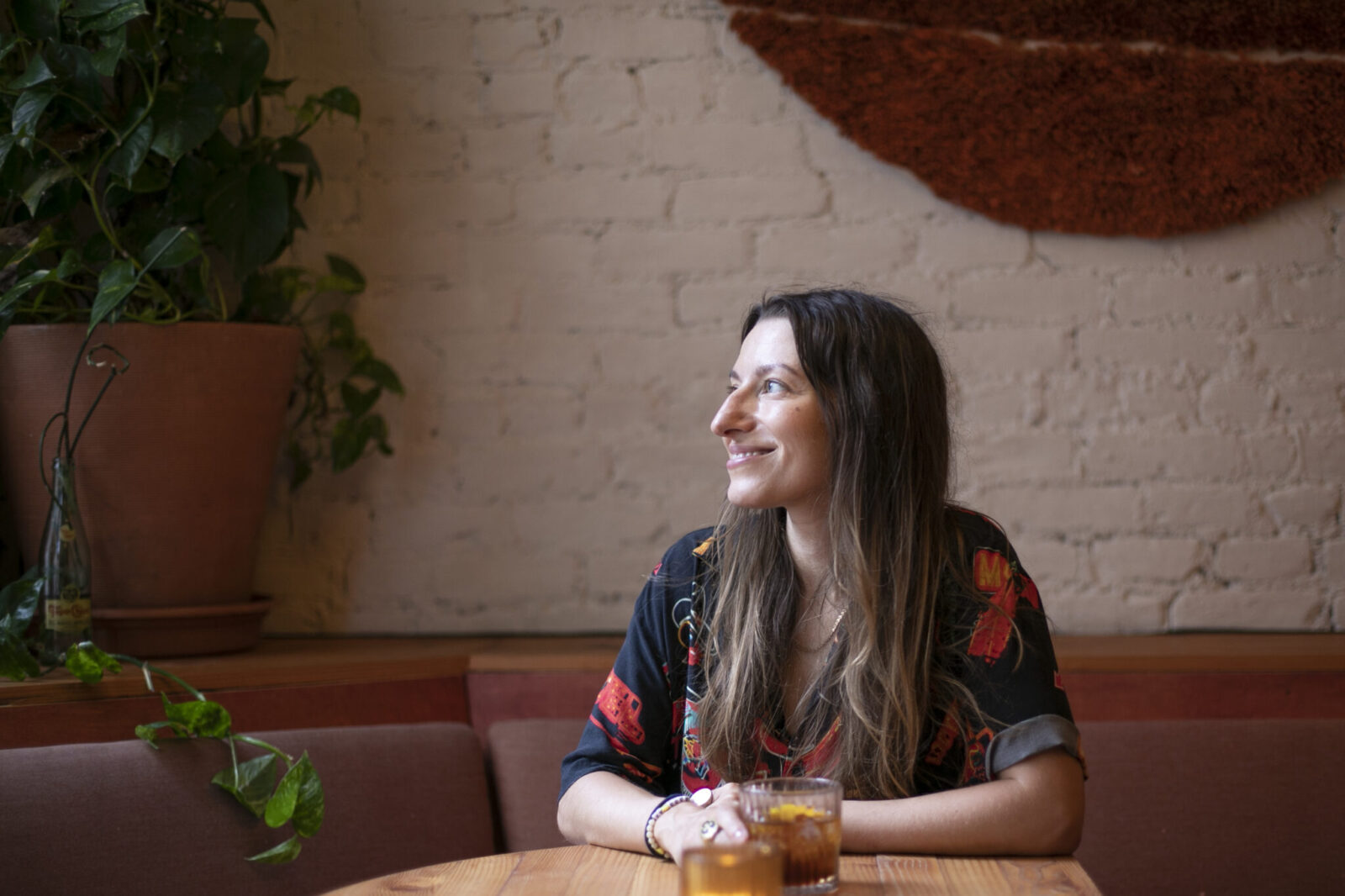
“Whether we’re going to a club or doing anything social, we’re ingrained with the belief that we need alcohol to have fun. Because that mindset has been the default in society for a long time, it’s really exciting and worthwhile to prove that it’s not the case.”
“But you can be the first person on the dance floor or the one who stands up and starts singing Karaoke, even without drinking. Honestly, the high you get from that is so much better than when you’re drunk.”
In 2018, when Lorelei opened Listen Bar, she still enjoyed alcoholic drinks.
Many people mistakenly assume that she opened an alcohol-free bar because she stopped drinking altogether, but she says it was never her intent to abstain from alcohol completely.
“For example, if I have plans to exercise the next morning, I don’t want to drink the night before. As you live your life, those moments where you choose not to drink naturally become more frequent.”
“I’m not particularly focused on reducing people’s alcohol consumption. What I care about is creating more time and space in society where people can choose not to drink. The more access we have to that experience, the easier it will be for people to recognize and choose them as viable options.”
As she worked to increase such options, she found that she stopped drinking alcohol altogether about two years ago.

“Not Anti-Alcohol”: What makes a great bar that welcomes everyone
People often assume that those who don’t drink alcohol are serious, unfun, and unable to loosen up.
This is why Listen Bar focuses on “offering the best possible time and experience”, proving that a fun party can happen even without alcohol.
By providing high-quality drinks that emphasize taste, creating creative and stimulating environments, and designing spaces that encourage conversation, Lorelei believes that more people will choose to engage in sober curious experiences.
This was the vision she had from the very beginning.
She put all of her knowledge and experience that she gained in her job in advertising into producing the Listen Bar. It fit well with the latent needs of customers that were not being met before, and gradually it began to receive a lot of support and recognition.
When something new and cool is born in NYC, eventually it inspires the whole world. It will surely lead to major innovations in the world of alcohol-free drinks. Her blueprint of an alcohol-free bar ー something that didn’t exist at the time ー was a challenge to create new value.
“I think it was important that Listen Bar never positioned itself as anti-alcohol. We don’t criticize people who drink, nor do we try to get them to stop.”
“We don’t care if people are sober or drunk. It is more important to spread seeds of positivity than to judge others negatively for their choices. None will be open to new ideas if they feel judged.”
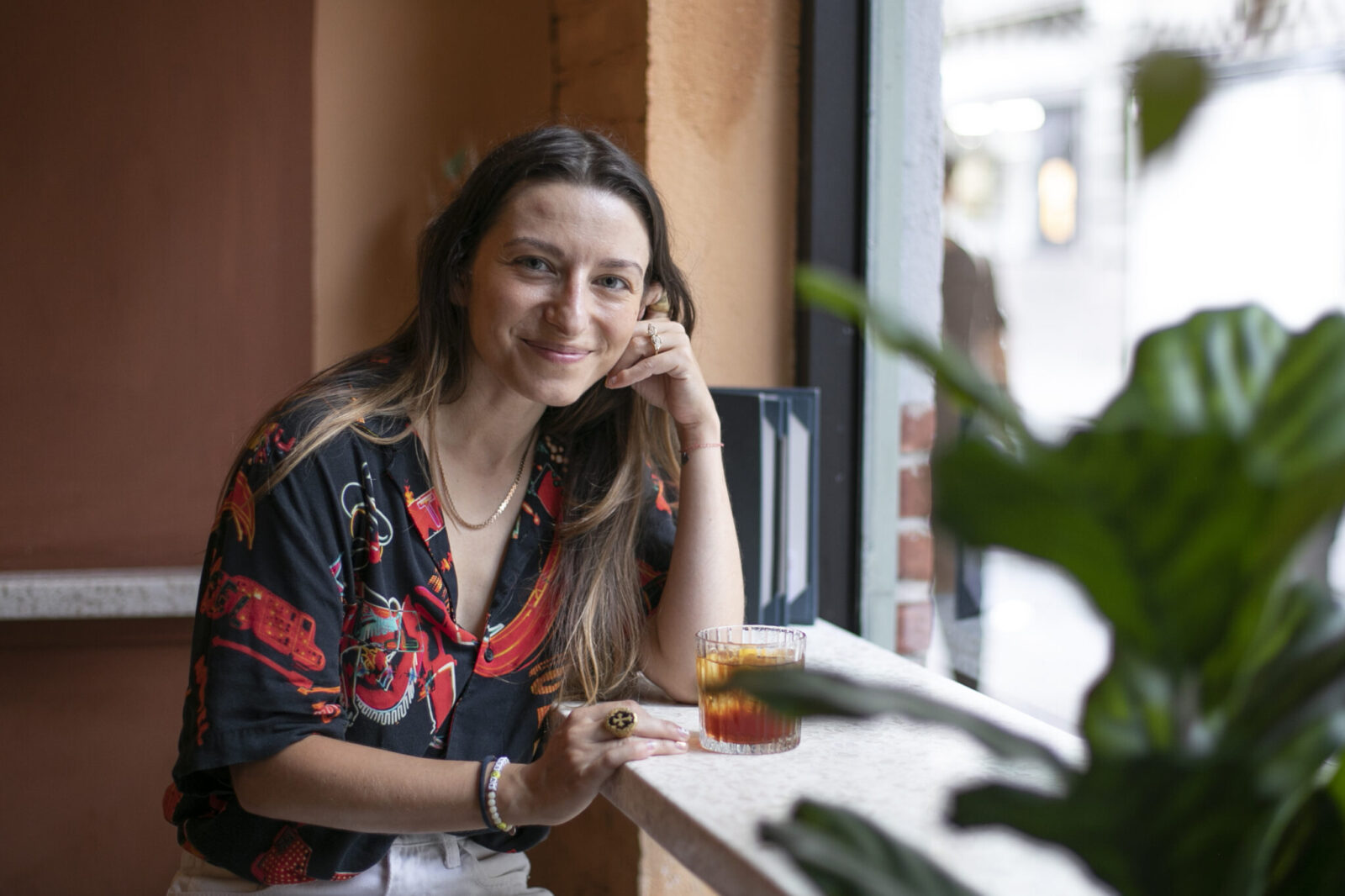
Listen Bar welcomes everyone, whether they are sober, drunk or hungover.
Lorelei knows from first-hand experience that it is possible to have better experiences with more self-confidence without drinking alcohol. She believes that accumulating such experiences in society and city life can be beneficial for everyone.
“The better I got at “not drinking alcohol”, the more often I chose to make that choice. Let’s say there is a muscle for not drinking alcohol. The more that muscle is trained, the easier it is to make the choice of whether to drink alcohol or not according to your own will. As long as a person is satisfied with their choice, I respect it.”
“What’s important in the alcohol-free space is recognizing that there’s a spectrum. At Listen Bar, there are people who are completely sober, others who are just taking a break, and those who drink regularly but want to switch things up on the same night. I believe there should be a variety of choices available like that in the world.”
To prove that alcohol is not needed to have fun
The name Listen Bar is based on the concept of a bar that offers a space for music and conversation.
Lorelei believes a good bar must have a good selection of drinks on their menu and great music. At Listen Bar, the bartenders are always musicians. She came up with the idea because musicians often also work as bartenders.
The concept of combining drinks and music was a big hit and they received countless offers to collaborate from legendary dive bars, trendy clubs, fancy rooftop lounges, and all kinds of locations that had the perfect space for a great night out.
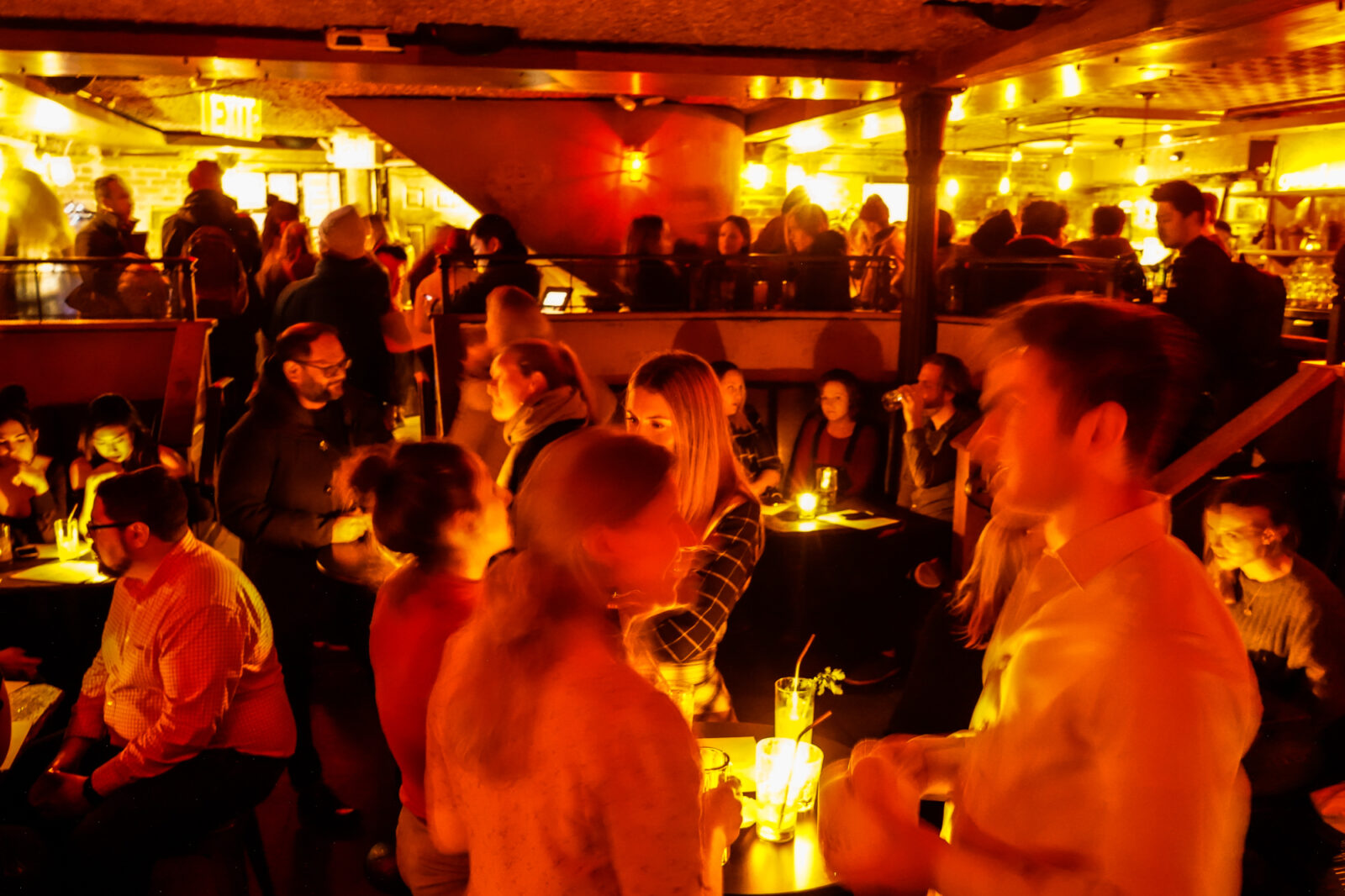
“The true essence of a bar is in the experience you get there. What people seek are places where they can enjoy good conversation, meet cool people, and listen to great music. Drinks are just an excuse to go there. It’s important to keep that perspective and always think about what defines a great bar to try to realize it. What is necessary is not alcohol, but great drinks.”
“I wanted to prove at Listen Bar that you don’t need alcohol to have fun,” she reflects on Listen Bar’s first Halloween party, where guests in costume got to sing karaoke.
“The response we got from people was amazing. People who said things like “I can’t sing when sober” or “I have to get drunk first” were up on stage five minutes later singing their hearts out. I was convinced that our concept was a good idea and the timing was right when I experienced the energy in the bar that day.”
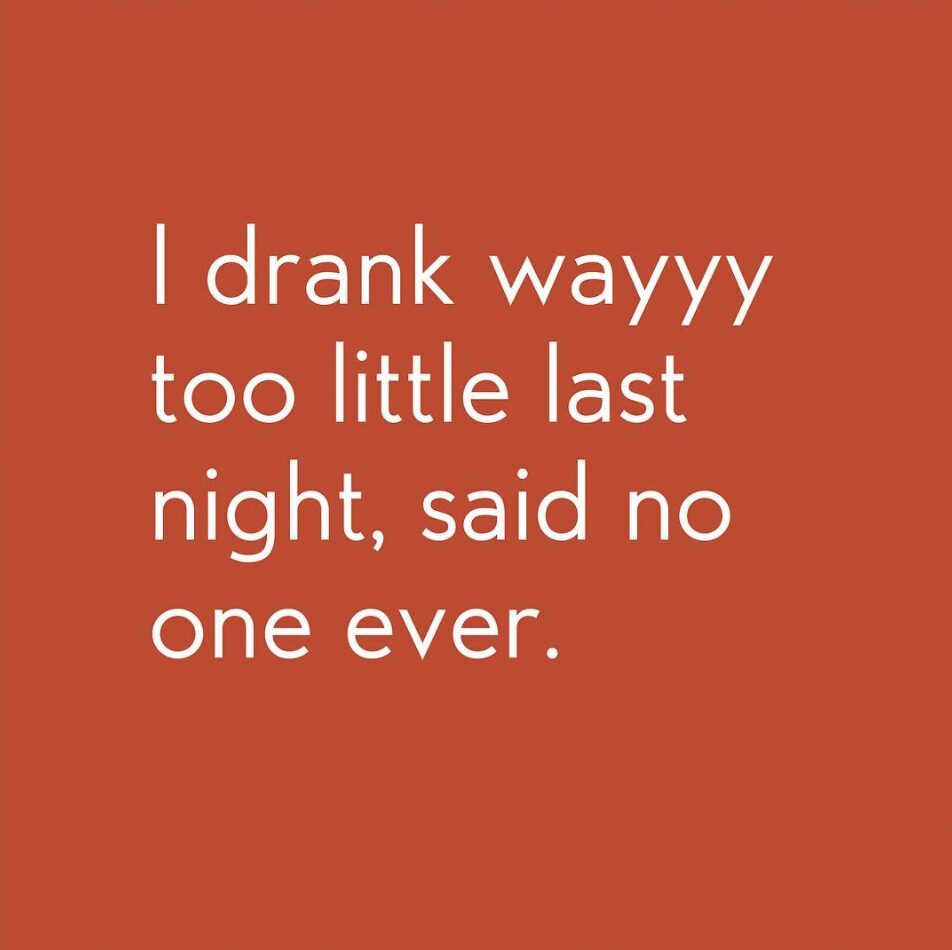
“Why do people always drink too much and regret it later? Even though it’s our own choice, and we know we will regret it later, why do we keep drinking?”
Lorelei posted such questions on her social media. As the offers for interviews and media requests began to grow, she started being asked to write articles herself. She got a lot of messages from her followers on social media asking when the Listen Bar would open.
Of course, not everything went smoothly and some people were critical at first. Some did not accept the idea of an alcohol-free bar and commented, “A bar without alcohol? What’s next, a restaurant without food?”
However, the number of people who thought it was a cool idea grew, and Listen Bar continued to garner public attention.
From health to exercise, the backdrop of the growing alcohol-free lifestyle
People of all ages, genders, races, etc. come to the Listen Bar.
About a third of people are completely sober and the remaining two-thirds are regular drinkers. In NYC, where there is no shortage of places to go drinking every night, Listen Bar is an opportunity to take a break from alcohol or to do something different for one night.
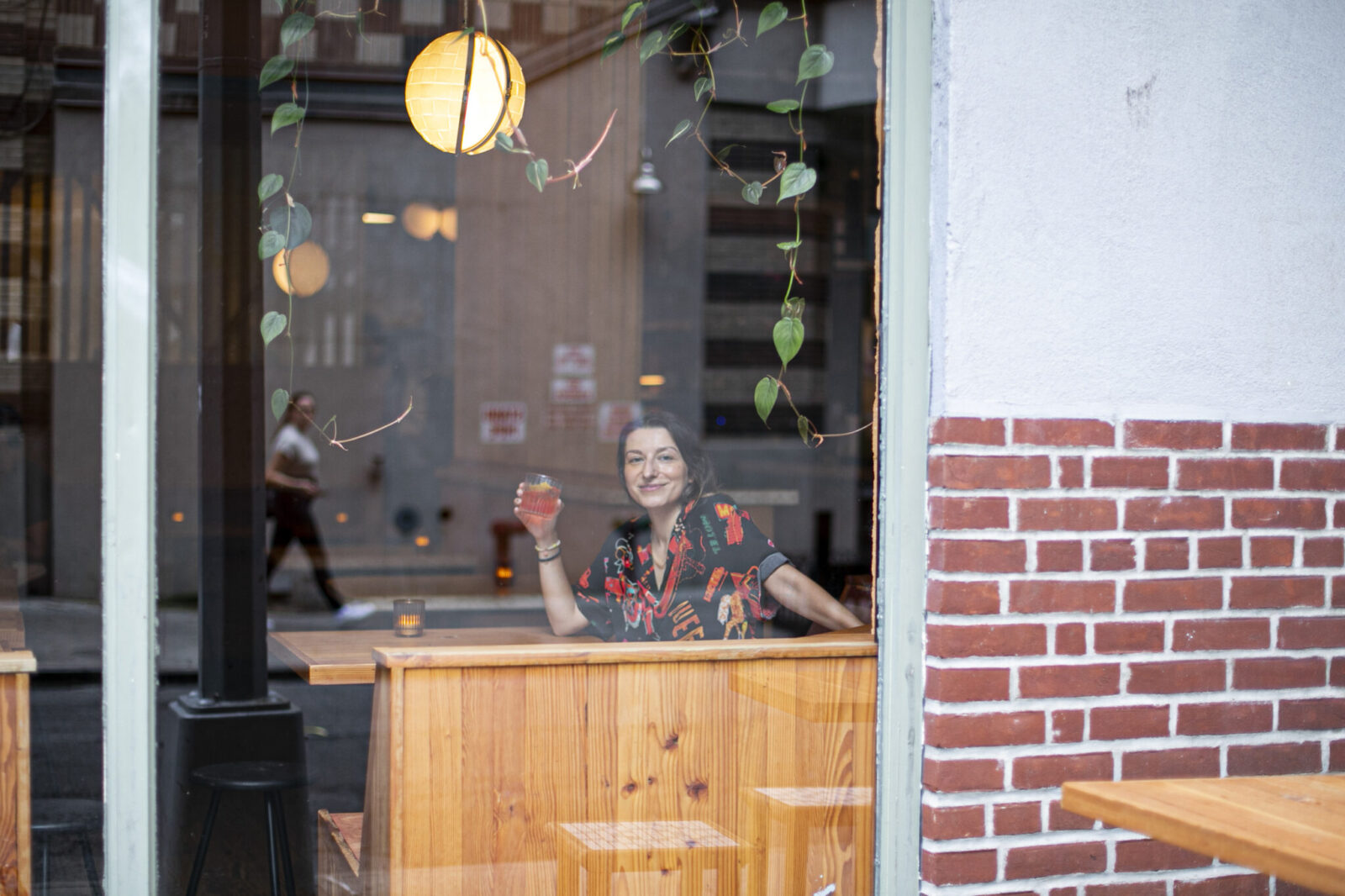
Another interesting fact is that over 60% of customers are female. Lorelei says that this trend is largely influenced by the differences in health awareness. Women who are more health conscious are also more keen on health-related information.
“Women who are more interested in what they put in their bodies in terms of food tend to also think about it with drinks. When you spend your time doing yoga, drinking organic juices, and meditating, spending half the weekend being hungover begins to feel silly.”
There is also a growing number of men who feel more comfortable being sober, and in many cases, it is attributed to their exercise regimes and lifestyles.
Athletic Brewing is a fast-growing alcohol-free beer brand in the US and this brand is also making a big impact.
Athletic Brewing is the world’s largest craft brewery that specializes in alcohol-free beers. Its lineup of beers was inspired by the lifestyle of its founder, who is also a fitness enthusiast.
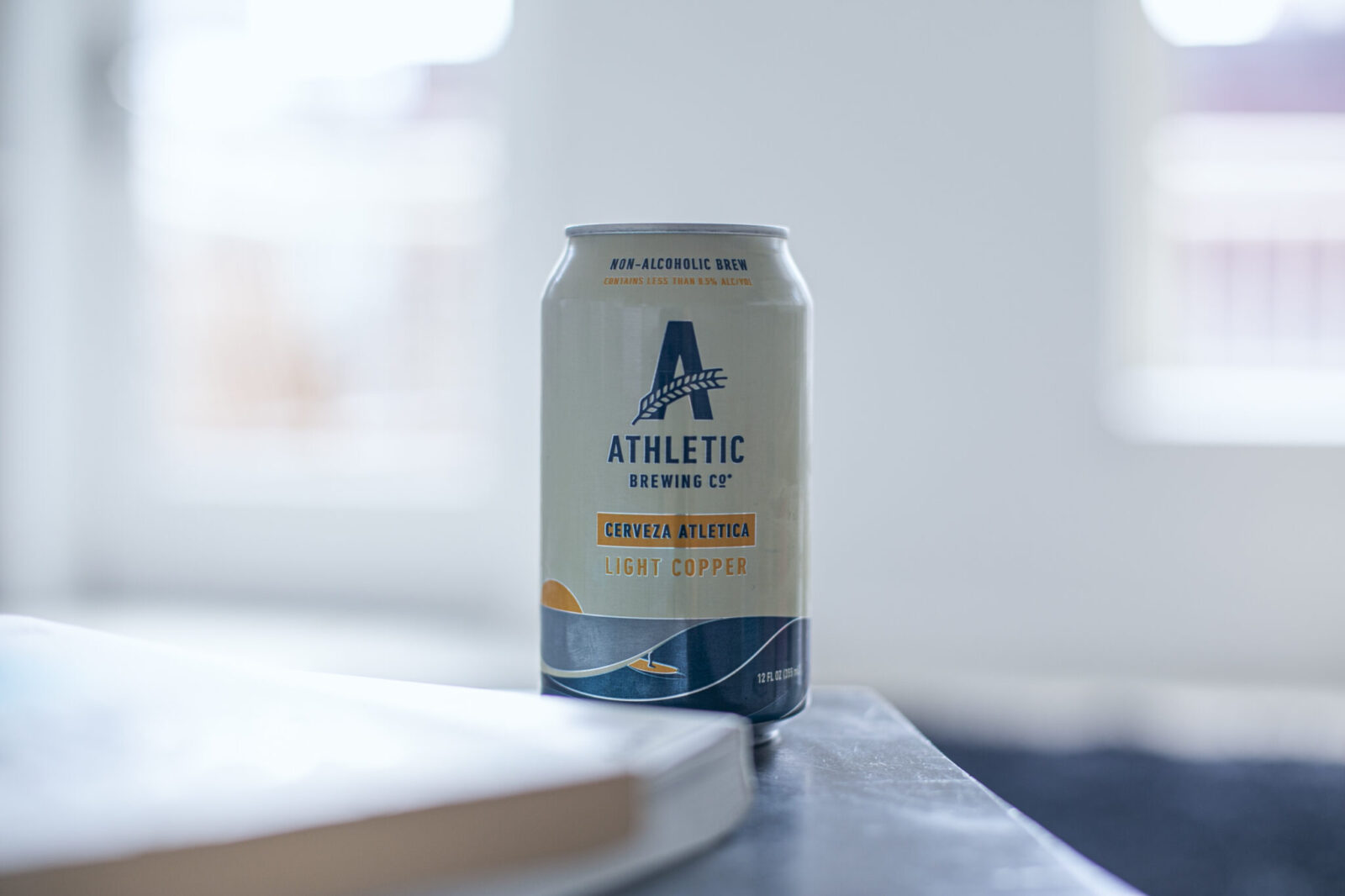
“One of the reasons why Athletic Brewing is so popular is that it focuses on being active while also having fun and drinking beer and maintaining maximum performance at the same time. Being able to enjoy a delicious alcohol-free beer after a good run with friends resonated well and met the needs of actual consumers.”
This brewing company sponsors the Ironman triathlon race and other famous sports events. By marketing their products towards athletes, it became a trendy drink that is perfect for post-workout refreshments.
What people seek at an alcohol-free bar
So why is it that people choose to go to Listen Bar parties instead of regular bars in the city?
Of the many reasons that are voiced, Lorelei says that one common factor is that “everyone is looking to be a part of a community.”
Although “drinking buddies” were common in the past, people are now looking for new relationships that do not involve alcohol. In a society where drinking alcohol has been the norm, sober people tend to feel like the odd man out. Listen Bar is a place for such people to meet others who share the same values as them.
“People want to have fun without drinking alcohol. It is very liberating when they find a space where they can share a common desire.”
“I realized that being sober is not the problem, but it is the environment that surrounds sober people that is problematic. It is our society and culture where alcoholic drinks are the default that makes the people who don’t drink feel marginalized.”
Once that default was removed, she found that many people actually sought memorable experiences in a nightlife free of alcohol.
Although soda drinks are often the only option at regular bars, Listen Bar allows guests to interact with the talented bartenders and enjoy exploring the various drinks on the menu with other people, while experiencing the ingenuity of the multiple layers of flavors in their drinks.
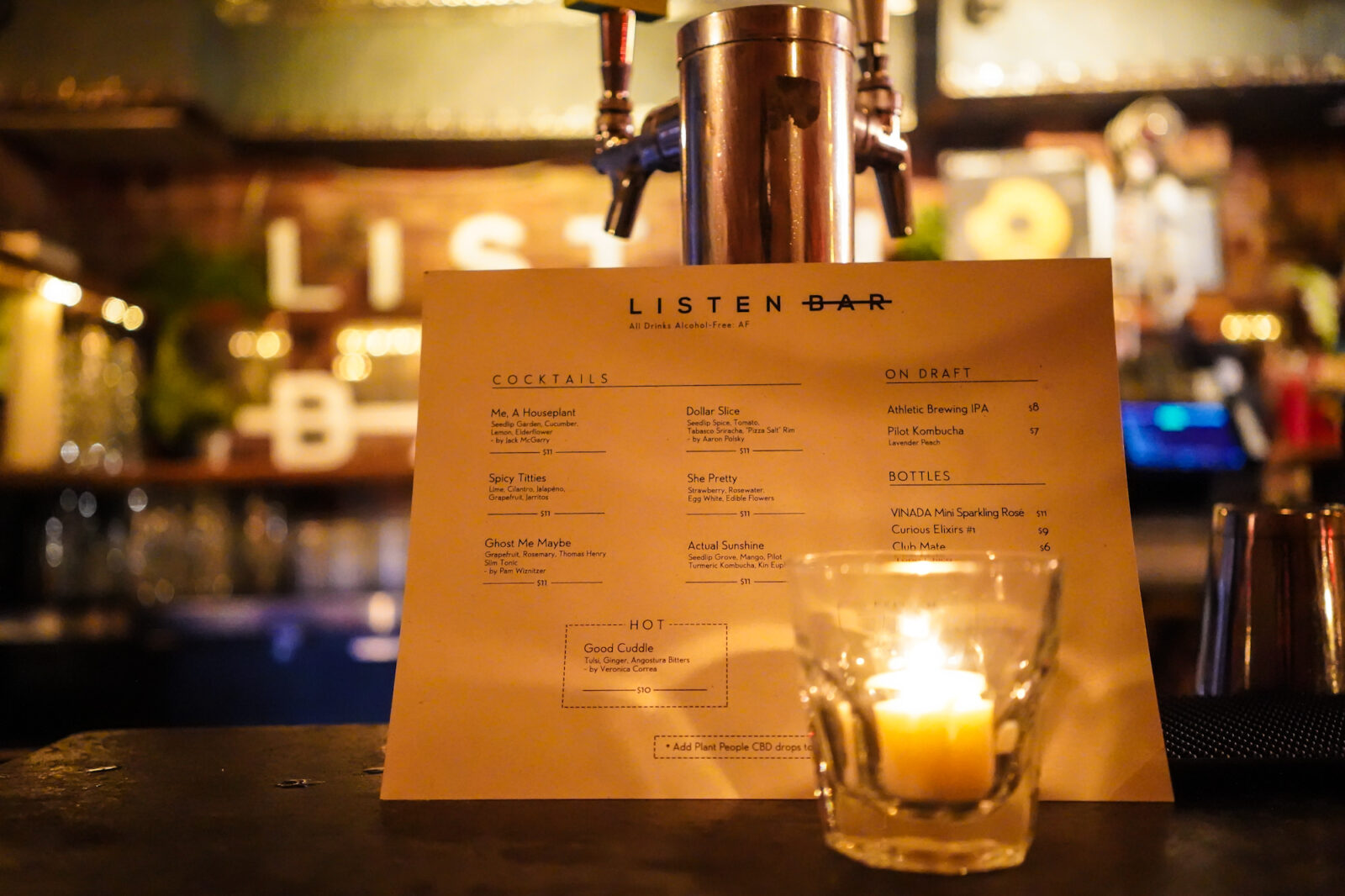
Lorelei also says that many people experience a rise in self-confidence by not drinking alcohol.
Alcohol is also known as “liquid courage” and is considered something to drink to ease anxiousness or encourage bold behavior.
“One of the reasons I drink less alcohol in my 30s than I did in my 20s is because I am more confident in who I am now. There were many times when I wasn’t sure of myself and felt anxious so I drank, but alcohol didn’t bring me real confidence – it often led to greater anxiety the next day. As I experienced going out without alcohol more often, I felt more confident in myself and learned to express myself better.”
Many people at Listen Bar have experienced something similar. Having a place of friends and like-minded people who understand sobriety is comforting.
They also found that people tend to treat others more kindly when they are not drinking alcohol.
“When people get drunk, they can become loud and inconsiderate of people around them. In an alcohol-free environment, everyone is more attentive and kinder to each other. The atmosphere encourages positive interactions so there are fewer arguments, which leads to a more comfortable and peaceful experience.”
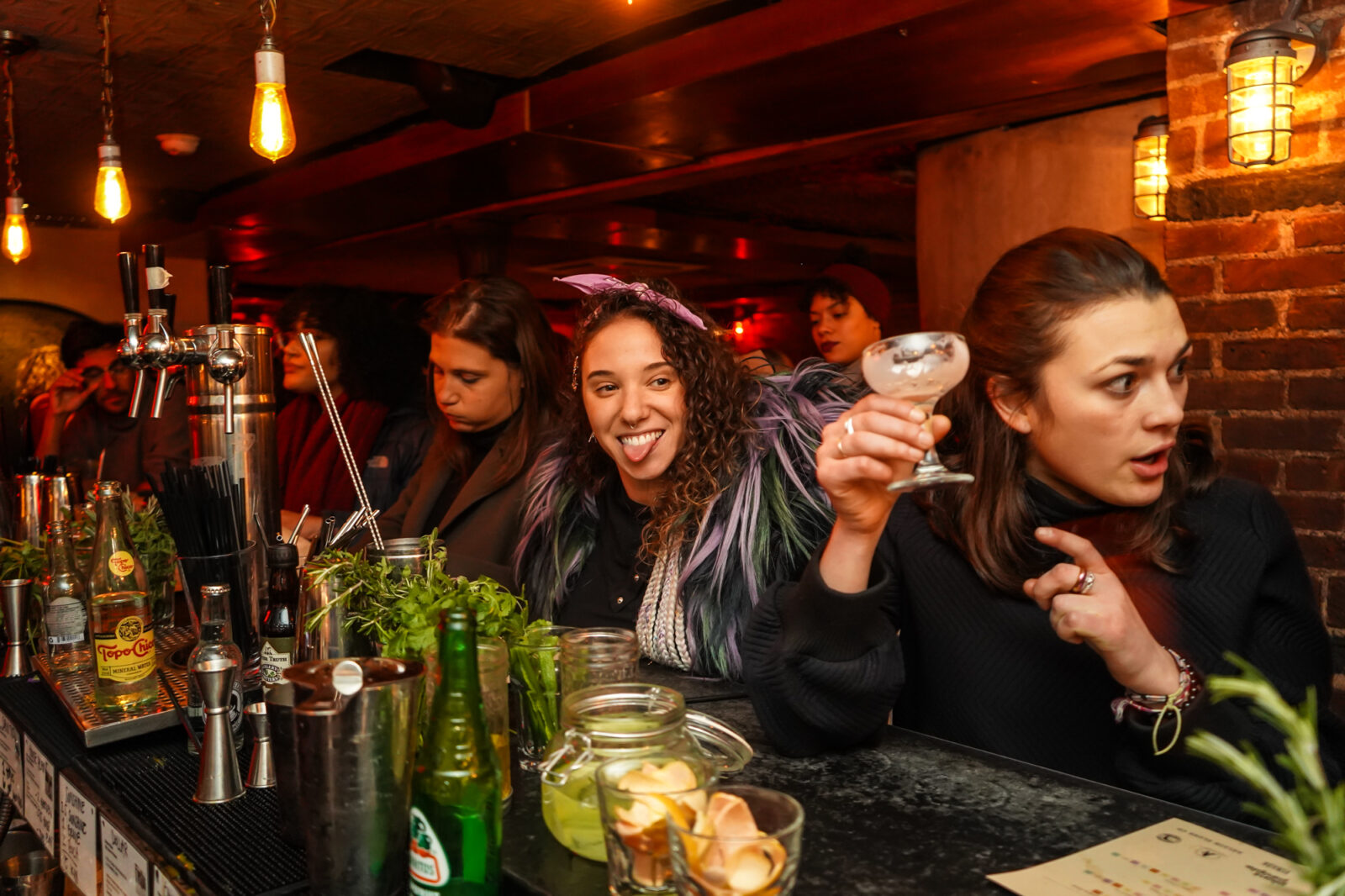
The alcohol-free movement being led by women
Lorelei says that it was inevitable that a woman entrepreneur would lead the opening of an alcohol-free bar.
While men have also made valuable contributions, the forefront of the alcohol-free movement has been spearheaded by many powerful women like Ruby Warrington, the author of Sober Curious, and the many women-led brands in the alcohol-free industry.
“The alcohol-free movement began with the voices of women. I think this is a very important fact. The alcohol industry has been dominated by men, from bartenders, bar owners, alcohol brand producers, etc. and women have been an overwhelming minority. Women had to fight to make a place for themselves.”
“However, in the alcohol-free industry women are playing a central role in the movement and it’s really exciting.”
“It’s great to see the voices of women being in the forefront and center of building something from the ground up for everyone. Whether they are bartenders, a brand owner, or even a guest, women can now feel like they are part of an inclusive environment.”
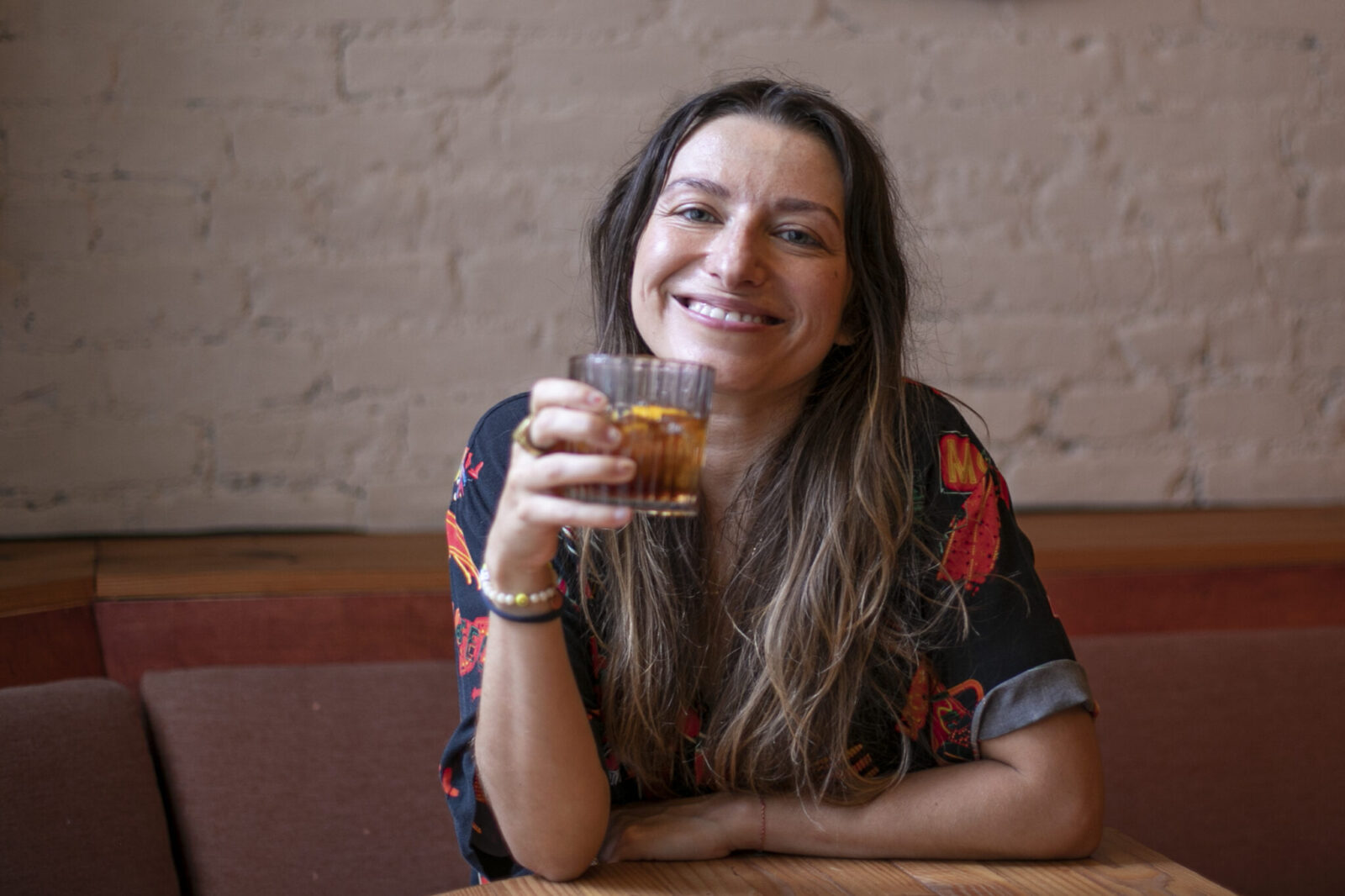
Lorelei smiles proudly as she says, “I think the most wonderful change is that we are now able to see all identities as part of a spectrum, whether it is how people identify their gender or how they choose to drink.”
“It is not a limited choice between the two options of being an alcohol drinker or a non-drinker. Even the same individual may choose to enjoy alcohol at times while choosing not to at other times. There are a lot of options that exist in between.”
She continues to work on creating spaces that are open to anyone, anytime, and in any mood that allows them to enjoy congenial space and exceptional experiences.
She will continue to throw Listen Bar parties in the US and overseas, as they go from creating the alcohol-free blueprint to continuously raising the standard.
Shooting Location: Donna
Translation: Sophia Swanson
Editor, Writer, and Video Creator based in Tokyo, Japan. After years of backpacking and volunteering abroad, she fell in love with the charm of Southeast Asia while working in PR. Experienced as an editor at Huffpost Japan and a video director/producer for BuzzFeed Japan and other media outlets, she now specializes in crafting content themed on social issues and sustainability across various media platforms.
Editor and creator of the future through words. Former associate editor of Huffington Post Japan. Became independent after working for a publishing company and overseas news media. Assists in communications for corporates and various projects. Born in Gifu, loves cats.
Freelance photographer based in New York. Born in Tokyo, Japan. She started taking photographs at the age of 10, studied classical and specialized techniques in the photography department at the university, then became a freelance photographer in 2009. She currently operates studios in Brooklyn, NY, and Kichijoji and Tsukiji in Tokyo, while creating various works including commercials, portraits, fashion, and art.
